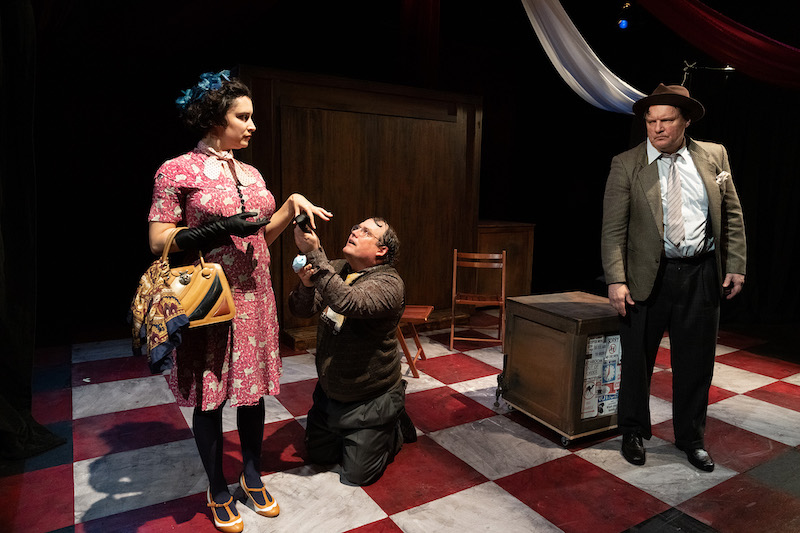Yaacobi & Leidental
Reviewed by Steven Leigh Morris
Odyssey Theatre Ensemble
Through April 30
RECOMMENDED
The lure of lurid allure: Benny Hill meets Samuel Beckett in the late Israeli playwright Hanoch Levin’s farcical and deceptively probing play with music (by Alex Kagan). (Levin’s play is translated from the Hebrew by Naaman Tamuz and is being presented by the Odyssey Theatre Ensemble in its U.S. premiere. Levin died in 1999.)
It starts a bit like Gogo and Didi from Waiting for Godot, with a couple of fools — alpha Itamar Yaacobi (Ilia Volok) and beta David Leidental (Michael Redfield) — connected at the hip in a kind of wasteland. This wasteland, however, is a balcony where the pair pass the time playing dominoes and drinking tea. (The “balcony” is one of many furniture pieces on rollers that can be ushered in and out, as needed.) Leidental is perfectly content with this arrangement, appreciating the pleasantness of life’s daily rituals, while Yaacobi, suffering from an existential crisis (of course), feels that he’s wasting his time, wasting his life. “I’m a very busy person,” he repeats, the mantra of a man who has nothing to do. Throughout this comedy, death is bearing down with potentially bludgeoning questions for all of the play’s characters: What have you accomplished? Who actually cares about you? And what can you do about it? The answers to these questions are unspoken: Nothing, Nobody, and Nothing. These disheartening replies hang over the maroon and white circus tent of Pete Hickok’s animated set, supplemented by the rumpled quasi-formality of Denise Blasor’s charming costumes.
Yaacobi doesn’t wish just to walk away from his life-long friend gently. No. He wants to torture him, humiliate him, for the crime of being a nebbish. Gratuitious cruelty and its attendant masochism forms the lifeblood of these characters, and of Levin’s view of things.
Music director Nisha Sujatha Anunasalam accompanies a few songs crooned by the actors throughout the play on a spinet tucked off to one side, giving this human puppet show the whiff of a cabaret, all under Yonatan Esterkin’s playful-artful direction.
The Benny Hill part settles in with the arrival of Ruth Shekhash (a gleefully sadistic and manipulative interpretation of a sex bomb by Sera Heywood-Rakhimova). In appearance, she’s more Anime than human: Her breasts and derrière have been inflated with costume pieces, so that much of the humor comes from watching the actor adjust her bottom while seated, to make room for the thing on the chair.
The two male fools have no idea who she is, or what she wants, because they can’t tear their focus away from her “Big Tuches,” which becomes their name for her. I don’t recall another play with so much verbiage given to female anatomy:
Ruth sings:
“Down down, at the end of my back,
“A magnificent backside blooms,
“And on either side of its delicate crack,
A pair of pink-colored balloons.
“Since the day I was born it’s been in tow,
“In the folds of my dress it likes to hide;
“Wherever I turn, wherever I go,
“Big Tuches comes along for the ride.”
Yaacobi is determined to dump Leidental and date Ruth, though he has nothing to recommend him: no personality, no accomplishments, no interests, a mediocrity in life’s strip club, ogling Ruth from behind:
“Jiggle around, jiggle around. Left goes up, right goes down, Left goes down, right goes up, Head is dizzy, heart throws up.”
On their first date, she tells him she plays piano, an artist, and that she’ll slap him in the face for no reason, which she does, and tells him she did it for no reason. For all these qualities, he’s smitten.
She’ll play him for the fool he is, even in marriage, withholding and imperious, seething that men’s value lies in their accomplishments while her value resides in her flesh.
“Itamar,” she tells him, “I’ll make your life miserable and then bury you, remember me!”
Meanwhile submissive Leidental is happy to be her sexless slave, cleaning up and obeying her every ruthless command, while his continued presence infuriates Yaacobi. No matter, she’s in charge. Until she isn’t.
Leidental croons his love song for her benefit in “The Girl of My Dreams.”
“Will you call a doctor at night,
“When I lay at your side in a daze?
“Will you be the one that I see
“With my final, fading gaze?”
Throughout this plaintive and pathetic romanticism, she’s cleaning her teeth with a fingernail.
The play, and its splendid production, is a late 20th century relic, or seems like one, predating discussions of gender fluidity while tying domestic despair and isolation into a rigidly binary sexuality — just the kind of traditional gender roles railed against by Tennessee Williams, William Inge and Edward Albee (all gay male American playwrights) around the same time that playwright Levin was working in Israel.
This production raises two questions at odds with each other. I don’t know the answer to either, but this show is well-worth seeing, aside from its mastery of farce and its thoughtfulness. It’s worth seeing for compelling us to grapple with these two questions:
Has Levin distilled some cultural essences that are timeless, despite ongoing discussions of gender fluidiy in academia that maintain we can — or should — rise above the isolating, binary sexual compulsions that have made hetero pornography a multibillion dollar industry? (In many ways, Levin’s play is unwittingly about the inexorable rise of porn, its embrace of sado-masochism, and the emotional costs of those addictions. Sort of like, the men of our nation watch porn while waiting to die.)
Or is Yaacobi & Leidental a museum piece, an homage to the misery that once was, that we’re in the process of rising above? How primal is the disconnect between people, particularly between men and women? Will there ever be a time we can call it history?
I haven’t lived long enough to answer those questions, and probably never will. But I wouldn’t miss this production for laying out those questions so smartly and stylishly.
Odyssey Theatre Ensemble, 2055 S. Sepulveda Blvd., WLA; Fri.-Sat & Mon., 8 pm; Sun., 4 pm; thru April 30. https://OdysseyTheatre.com Running time: 100 minutes, no intermission.











